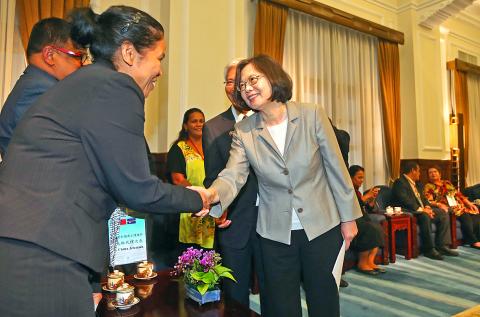President Tsai Ing-wen (蔡英文) yesterday met with Palauan President Tommy Remengesau Jr in her first open meeting after assuming the presidency on Friday, departing from the customary appellation used by former president Ma Ying-jeou (馬英九) by referring to her administration as the “Taiwanese government.”
Under Ma, public meetings with foreign dignitaries used the formal title of “Republic of China (ROC) government” when referring to Taiwan. While the word “Taiwan” was used sparingly, it was very rarely used in the context of the “Taiwanese government.”
Tsai welcomed Remengesau, who was in Taiwan for Tsai’s inauguration, and said that the two nations could cooperate on the issue of marine conservation.

Photo: CNA
When speaking on bilateral cooperation, Tsai used the term “we” and mentioned “the ROC.”
She said Taiwan can learn from important environmental achievements during Remengesau’s tenure, such as the Micronesian Center for a Sustainable Future and the Palau National Marine Sanctuary.
Meanwhile, Beijing yesterday warned Taiwan that it would cut off critical contacts if Tsai does not state her support for the “one China” framework.
The comments came a day after Tsai’s inauguration speech, in which she called for “positive dialogue” with China, but stopped short of any compromise on Beijing’s demands that she support its “one China” principle.
Beijing and Taipei have had regular, official communication since 2014, but that would stop unless Tsai acknowledges the so-called “1992 consensus,” Xinhua news agency quoted China’s Taiwan Affairs Office spokesman Ma Xiaoguang (馬曉光) as saying.
“The communication mechanism between the two departments can only continue if the 1992 consensus, which represents the common political foundation of the one China principle, is adhered to,” he was quoted as saying.
In her speech, Tsai reiterated her stance of recognizing that a meeting took place between the Chinese Nationalist Party (KMT) and Chinese officials in 1992, but did not endorse it.
The “1992 consensus,” a term former Mainland Affairs Council chairman Su Chi (蘇起) admitted making up in 2000, refers to a tacit understanding between the KMT and the Chinese government that both sides of the Strait acknowledge there is “one China,” with each side having its own interpretation of what “China” means.

‘TAIWAN-FRIENDLY’: The last time the Web site fact sheet removed the lines on the US not supporting Taiwanese independence was during the Biden administration in 2022 The US Department of State has removed a statement on its Web site that it does not support Taiwanese independence, among changes that the Taiwanese government praised yesterday as supporting Taiwan. The Taiwan-US relations fact sheet, produced by the department’s Bureau of East Asian and Pacific Affairs, previously stated that the US opposes “any unilateral changes to the status quo from either side; we do not support Taiwan independence; and we expect cross-strait differences to be resolved by peaceful means.” In the updated version published on Thursday, the line stating that the US does not support Taiwanese independence had been removed. The updated

‘CORRECT IDENTIFICATION’: Beginning in May, Taiwanese married to Japanese can register their home country as Taiwan in their spouse’s family record, ‘Nikkei Asia’ said The government yesterday thanked Japan for revising rules that would allow Taiwanese nationals married to Japanese citizens to list their home country as “Taiwan” in the official family record database. At present, Taiwanese have to select “China.” Minister of Foreign Affairs Lin Chia-lung (林佳龍) said the new rule, set to be implemented in May, would now “correctly” identify Taiwanese in Japan and help protect their rights, the Ministry of Foreign Affairs said in a statement. The statement was released after Nikkei Asia reported the new policy earlier yesterday. The name and nationality of a non-Japanese person marrying a Japanese national is added to the

AT RISK: The council reiterated that people should seriously consider the necessity of visiting China, after Beijing passed 22 guidelines to punish ‘die-hard’ separatists The Mainland Affairs Council (MAC) has since Jan. 1 last year received 65 petitions regarding Taiwanese who were interrogated or detained in China, MAC Minister Chiu Chui-cheng (邱垂正) said yesterday. Fifty-two either went missing or had their personal freedoms restricted, with some put in criminal detention, while 13 were interrogated and temporarily detained, he said in a radio interview. On June 21 last year, China announced 22 guidelines to punish “die-hard Taiwanese independence separatists,” allowing Chinese courts to try people in absentia. The guidelines are uncivilized and inhumane, allowing Beijing to seize assets and issue the death penalty, with no regard for potential

‘UNITED FRONT’ FRONTS: Barring contact with Huaqiao and Jinan universities is needed to stop China targeting Taiwanese students, the education minister said Taiwan has blacklisted two Chinese universities from conducting academic exchange programs in the nation after reports that the institutes are arms of Beijing’s United Front Work Department, Minister of Education Cheng Ying-yao (鄭英耀) said in an exclusive interview with the Chinese-language Liberty Times (the Taipei Times’ sister paper) published yesterday. China’s Huaqiao University in Xiamen and Quanzhou, as well as Jinan University in Guangzhou, which have 600 and 1,500 Taiwanese on their rolls respectively, are under direct control of the Chinese government’s political warfare branch, Cheng said, citing reports by national security officials. A comprehensive ban on Taiwanese institutions collaborating or